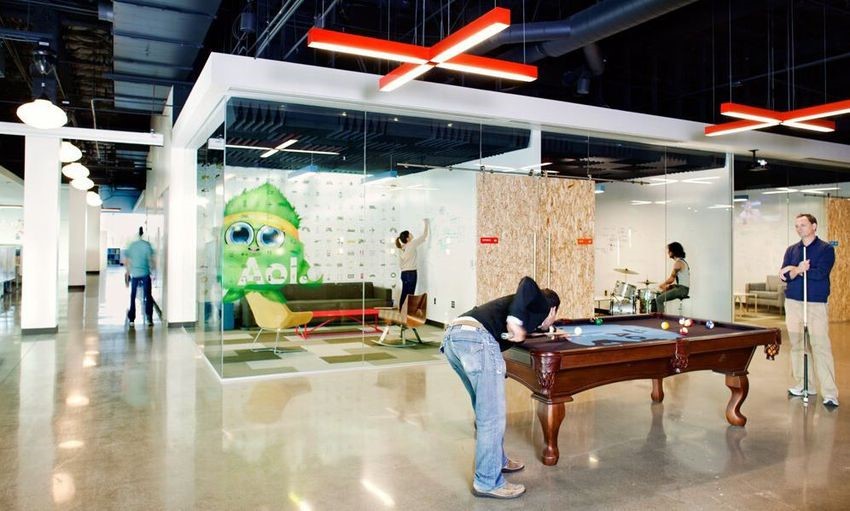
Academic institutions, recreation departments, and sports corporations may likely all have several things in common – but for certain, at least they all have one thing we know for sure: they all have employment environments. And consequently, there is a culture of the workplace. Further, it is well established that the most enjoyable of workplace environments translate desire and motivation into economic success. It is not surprising then, that the most successful companies also implement recreation opportunities into their corporate culture – in order to quickly capture windfall-like return on investment.

“If it isn’t fun, it’s not worth doing.” This seems to be the mantra of the youngest cross-sectional segment of the workforce. So, can they ever be forced to “act like grown-ups?” Well, that suggests that gown-ups aren’t having any fun. Yet, in the corporate culture of the new workforce, day-by-day there is a re-conception and re-invention of the workplace culture. Yes, this is a generational tide that cannot be turned. But, why try!?! Go with it – find the success that comes with healthy living and a high quality of life. This doesn’t necessarily mean more money – but it often does – and what’s gained in the process: self-respect – is priceless!
So, besides having accessible on-site sports and recreation opportunities, what are the ingredients of an enjoyable workplace environment? More likely than not, it starts with understanding, being committed to, and following through with implementing the following:
A complete embrace with shared experience, because shared experiences equate to better opportunities…
- Meaningful, appropriate challenges flow constantly – where the challenge level and skill level of the employees are matched well – this positively affects productivity, as well as opportunities to further increase skill levels. Also, the more meaningful challenges people encounter, the more engaged they become – to the point where they can and will operate as fully invested…
- And, being fully invested perpetuates successful experiences, which are also vitally important for sustaining healthy workplace environments…
- Autonomy yields contentment and enthusiasm for the work at hand. Some social situations, including work-centered activities, can help to promote individuals as self-regulated and self-governing individuals. But, the truth is that others may undermine self-knowledge, self-confidence, and self-esteem. Being attentive to spotting and unmasking the opportunities for autonomy is at a premium in the successful workplace, and can do wonders to revivify the entire work environment…
- Comfort – Also, minimizing unnecessary discomfort increases productivity. Research clearly demonstrates the value of comfort, especially where productivity is concerned…
- Next is freedom – because the more freedom that employees feel in their work environment – to have the ability to get the job done, on their own schedule and in their own way – the more productive they will be…this too, is well established…
- Locus of control also comes into play. Meaning, people have the need to exert influence within the context of their working environment. This does not mean that the workers plan every aspect of everything that goes on – but, workers should feel like they have some influence upon the nature of their work environment…
- Respect – When did treating other people with respect become so hard to do? Administrators show respect for their employees by asking questions, listening actively, and taking action on the ideas of the employees. These types of signals of respect can equip a cogent workplace for unprecedented relationship building. After that comes enhanced workplace culture as well as the inevitable economic success…
- And let’s not forget, today’s work environment is increasingly fluid. Therefore, flexibility is also a necessary ingredient in this cocktail of life-quality enhancement. For the employee, what will flexibility yield? Several things, actually, including but not limited to expansion of opportunities, greater consistency in successful work life/non-work life balance, and responsiveness to change. For the employer – being flexible is a win-win deal. Flexibility is a good management decision because, let’s face it – the corporate world is less static now than it ever has been! Ever! And, flexibility demonstrates that diversity in the workplace is highly valued!
- In all, positive experiences that are value-oriented are a must. Few work experiences have the ability to boost self-esteem and self-respect more than ones that leave an employee feeling like their boss believes they have the skills and ability to get the job done right.
It’s simple, really – and employees everywhere will tell you: If we enjoy being here, we’re going to give our best.

Sources:
America’s Job Exchange (2016). Available: http://www.americasjobexchange.com/career-advice/flexibility-at-work
Brian Tracy International (2016). Available: http://www.briantracy.com/blog/business-success/best-places-to-work-work-environment-business-ethics/
Homeroom (2016). The official blog of the US Department of Education.
Available: http://blog.ed.gov/
ifamily (2016) Available: http://www.ifamilystudy.eu/what-is-autonomy-and-why-does-it-matter/
Pop Up City (2016). Available: http://popupcity.net/does-our-environment-affect-the-way-we-work/
By Dr. Rodney J. Blackman and Dr. Fred J. Cromartie
Dr. Blackman is the Chair of Recreation Management at the United States Sports Academy, and can be reached at rblackman@ussa.edu.
Dr. Cromartie is the Director of Doctoral Studies at the United States Sports Academy, and can be reached at cromarti@ussa.edu.